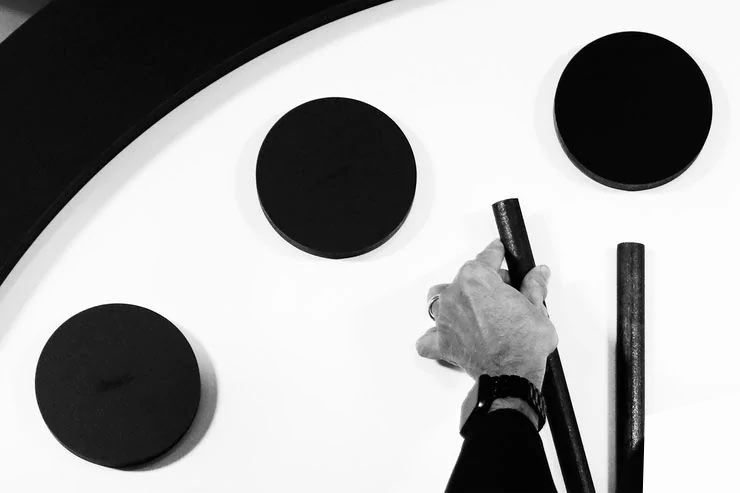Why the Doomsday Clock matters
By Rachel Bronson | February 3, 2016

Renowned graphic designer Michael Bierut has called the Bulletin’s Doomsday Clock the most powerful piece of information design of the 20th century, and last week’s Clock announcement showed its impact to have continued—and grown—well into the 21st. On January 26, the Bulletin dominated the news cycle and generated a global conversation about the world’s most intractable problems: nuclear security, climate change, and emerging technologies. We did so by releasing the 2016 Clock setting (still three minutes to midnight) and a powerful Clock statement that detailed the underlying factors that drove the setting decision. In a media landscape awash in manufactured stories and trivial conversations, a focus on sobering issues such as these is not something to breeze by casually. It is important.
The response to our message was tremendous. Even before the announcement, the Doomsday Clock was trending on Facebook and Twitter in the United States. That’s Jimmy Fallon territory. We were the top story in TIME magazine and the fourth most viewed article on the BBC website. We were picked up in thought-leading outlets such at The Atlantic, TheNew Yorker, Al Jazeera and the The Economist. Stephen Colbert devoted a significant portion of his “Late Show” monologue to the Clock (his recommendations for what to do differed from ours, but, hey, at least people have choices), and al Jazeera brought the Clock into people’s homes around the world. A colleague in the Turkish foreign ministry caught a discussion of the Doomsday Clock on his local evening news. A short video we posted on Facebook has been viewed more than 700,000 times and drove tens of thousands of readers to the 2016 Clock statement.
While the time we set on the Doomsday Clock is in and of itself important, the conversation that it generates is truly impressive. We stimulate a worldwide conversation in which people ask themselves and one another whether the Bulletin’s Science and Security Board got the time right—why, why not, what topics are missing, what we are weighting too heavily, etc. These are profound questions that, because of the Clock statement, the world stops to discuss each year, and then continues to consider throughout the year.
The Doomsday Clock is a potent example of the power that can be created when art and science come together. (Its history can be found here, and Clock changes over time can be found here.) Art aside, the interest in our statement belies the argument that science isn’t taken seriously any more. At the Bulletin, in fact, we’ve seen remarkable growth, both in visitors to our website and in the amount of time spent there, suggesting that trusted sources of expertise are still greatly valued.
It is essential that we stay focused throughout the year on the issues raised in the Clock statement. The Iran deal, for example, serves as a bright spot in the international security picture, but only if it is implemented properly. The pledges on greenhouse gas emissions that more than 190 countries made at the 2015 climate summit in Paris must also be implemented, and even if they are, without further emission cuts, the world is unlikely to stay below the goal: a worldwide average temperature increase of no more than 2 degrees Celsius above pre-industrial levels.
When California Governor Jerry Brown joined our press conference last week, he pointed out that politicians “react to people, to civilians, to interest groups, the media, business, labor, and cultural organizations.” The Bulletin and its readers must play their part, insisting—not just at Clock time, but throughout the year—that leaders around the globe act to address the world’s most pressing problems.
For many people, the Doomsday Clock has become the impetus to make such demands, and it is a privilege to be part of an organization that is the keeper of such an iconic and trusted tool. I hope you’ll take time to read and share the Clock statement and accompanying articles, if you haven’t already. And if you value what you read, I do hope you’ll consider making a contribution. We can’t do what we know we must, unless we have your support.
Together, we make the world safer.
The Bulletin elevates expert voices above the noise. But as an independent nonprofit organization, our operations depend on the support of readers like you. Help us continue to deliver quality journalism that holds leaders accountable. Your support of our work at any level is important. In return, we promise our coverage will be understandable, influential, vigilant, solution-oriented, and fair-minded. Together we can make a difference.
Topics: Doomsday Clock, Special Topics















